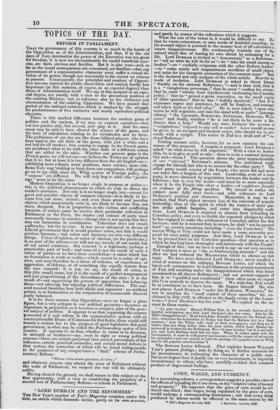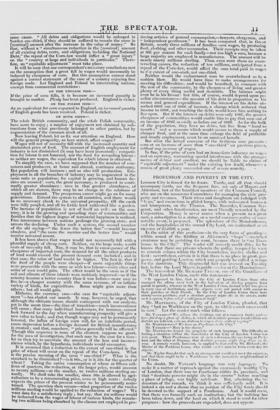CORN, WAGES, AND CURRENCY.
IN a succeeding column, a correspondent suggests a peculiar view of the effects of repealing the Corn-laws, on the "relative value of money and property." He supposes that the price of corn would be re- duced one-third; that wages, being regulated by the price of corn, would undergo a corresponding diminution ; and that every thing produced by labour would be affected to the same extent by the • Tait's Magazine for July 1837. Spectator, 1st July 1837.
same cause.cause. " All debts and obligations would be enlarged in burden one-third, if they should be suffered to remain the same in [nominal] amount after the increase in the value of money." So that without a " simultaneous reduction in the [nominal] amount of all existing debts, rents, and obligations, including the National Debt," the repeal of the Corn-law would inflict a " great injury" on the " country at large and individuals in particular." There- fore, an " equitable adjustment" must take. place. It will be seen that our correspondent's menatary conclusions rest • on the assumption that a great fall in wages would necessarily be induced by cheapness of corn. But this assumption cannot stand against a correct statement of the case of a country enjoying free foreign trade. Let England and Poland be intertrading nations, exempt from commercial restrictions:
ON THE ENGLISH SIDE—
If the price of corn falls, it is because an increased quantity is brought to market. Plenty has been produced. England is richer.
ON THE POLISH SIDE—
As an equivalent for corn exported to England, an increased quantity of English goods has been received. Poland is richer.
ON DOTH SIDES—
The whole British community, and the whole Polish community, have more to enjoy ; a surplus of enjoyment not obtained by sub- tractions from what previously belonged to other parties, but by augmentation of the common stock of all. Now leaving Poland, let us fix our attention on England. How will the general prosperity, as here stated, affect wages ? Wages will not of necessity fall with the increased quantity and diminished price of food. The amount of Enslish employment for industry is not diminished (it may have been increased) : competi- tion for labour is not lessened, nor the fund for rewarding labour : so neither are wages, the equivalent for which labour is obtained.
To simplify the case, we have supposed that the number of con- sumers and producers, at home and abroad, continues stationary. But population will increase ; and so also will production. Em- ployment in all the branches of industry may be augmented in the same ratio as population; for capital is growing, and human do- sires are unsated : corn, the great necessary, is produced in conti- nually greater abundance : save in that greater abundance, of which all are sharers, there may be no change in the relations of supply and demand. The prosperous career might go on for many generations. Extend the system to all countries, and there would be no necessary check to the universal prosperity, till the earth were fully peopled, and all its fertile land cultivated like a garden. The increase of population is not of itself an evil : on the con- trary, it is in the growing and spreading state of communities and families that the highest degree of terrestrial happiness is realized. Free intercourse between nations prolongs the growing state, and arrests the declining. Under such a system the second member of the old saying—" the fewer the better dire "—would become obsolete, and "tile more the merrier and the better fare" would receive universal assent.
It has been shown that wages would not necessarily fall with a plentiful supply of cheap corn. Neither, on the large scale, would rents of necessity fall. Nay, it may be, that in consequence of the cheapness of imported corn, the demand for all the other products of land would exceed the present demand corn included ; and in that case, the value of land would be higher. The filet is, that if the food of the people were cheaper—if more enjoyable things were procurable with the same or with less labour—every class and order of men would gain. The effect would be the same as if the soil and climate of these islands were suddenly improved—as if the country became a better country than it was before—more easy to live in—a cheaper country with the same revenue, of an infinite variety of kinds, for expenditure. Some might gain more than others ; but all would gain. Hitherto, the currency case—the case for "equitable adjust- ment "—has eluded our search. It may, however, be urged, that although the ultimate issues should correspond with our analysis, yet in the mean time—the time of transition—much inconvenience will ensue ; that many individual landowners, for instance, cannot look forward to the day when manufacturing prosperity will give a new value to land; and that though wages may not be permanently lowered, the influx of foreign corn will, for an indefinite period, cause depression before a foreign demand for British manufactures is created ; and that, somehow, " prices generally will be affected." Though this sequence is none of the clearest, suppose we grant, for the uses of investigation, that such may be the case for a time : let us then try to ascertain the amount of the loss and inconve- nience which, by the hypothesis, individuals would encounter.
It is assumed that m reduction to the extent of one-third in the price of wheat will occur on the repeal of the Corn-laws. What is the precise meaning of the term " one-third ?" What is the standard to be diminished ?—is it 80s., or is it 50s. for the quarter of wheat ? Taking the entire consumption of wheat at fifteen mil- lions of quarters, the reduction, at the larger price, would amount to twenty millions—at the smaller,, to twelve millions sterling an- nually. We shall take the smaller, since 50s. is allowed by agri- culturists to be a remunerating price, even at high rents : nobody expects the prices of the present winter to be permanently main- tained. The question then occurs—what proportion of the twelve millions sterling would be applied to the reduction of wages? We want data for a satisfactory reply ; but say, that ten millions would be deducted from the wages of labour of various kinds, the remain- ing two millions being absorbed by the classes not employed in pro-
ducing articles of general conauwption,—lawyers, clergymen, and • "independent gentlemen." It has been computed that, in Great Britain, nearly three millions of families earn wages, by producing food, clothing, and other necessaries. Their receipts may be taken at 30/. per annum for each family—not too high a sum, because a large majority are employed in manufactures. The amount will be nearly ninety millions sterling. Thus, even were there no coun- teracting causes, the reduction of' ten millions, anticipated from a repeal of the Corn-law, would affect the sum total paid in wages to t! e extent of one-ninth, not one-third.
Neither would the embarrassed man be overwhelmed as by a sudden blow. He would have time to make arrangements for meeting his difficulties ; an would be benefited, in common with the rest of the community, by the cheapness of living and greater plenty of every thing useful and desirable. The balance might even be in his favour : but this, of course, would depend upon pe- culiar circumstances—the amount of his debt in proportion to his means and general expenditure. If the interest on his debts ab- sorbed 600/. out of 900/. of income, a change which reduced that income to 6001., not touching the debt, would leave him nothing to live upon. But if the interest on debts were only 1001., the greater cheapness of commodities would enable him to pay that sum out of an income of 600/. as easily as before out of 900/. As for the bulk of the population, they have no debts, but live from " hand to mouth ; ' and a measure which would secure to them a supply of cheaper food, and at the same time enlarge the field of profitable and steady employment, must be an unmixed benefit. See what the actual converse of the fictitious case presents : corn at an increase of more than " one-third" on previous prices, without any increase of wages. In fine, if the price of corn had an immediate influence on wages and on currency, warranting special interference with the arrange- ments of debtor and creditor, we should be liable to claims of " equitable adjustment " under the existing law itself, whenever a season of great plenty succeeded one of severe scarcity.
































 Previous page
Previous page